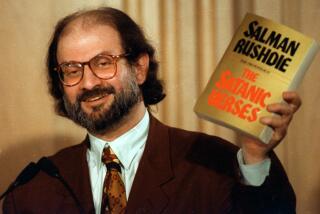Malcolm Muggeridge Dies; Noted British Journalist
LONDON — Malcolm Muggeridge, a journalist who gained celebrity status for his caustic commentaries on post-imperial Britain, died today in a Sussex nursing home, a lawyer for the family said. He was 87.
The lawyer, Vernor Miles, said Muggeridge never fully recovered from a stroke he suffered three months ago.
A journalist, author, teacher, World War II spy, editor and traveler, Muggeridge became famous through television in the 1950s and ‘60s. In 1957, the British Broadcasting Corp. banned him for what was perceived as an attack on the royal family.
He continued writing and interviewing after he moved in the 1960s to a 400-year-old, whitewashed cottage in Sussex, where he lived with his wife, Kitty, whom he married in 1927.
Through a career that included spells as a foreign correspondent in Moscow and Washington, Muggeridge remained both fascinated and repelled by politicians. He espoused no political cause but loathed communism.
That was born partly of disillusionment during a 1932-33 assignment in the Soviet Union as correspondent for Britain’s liberal Guardian newspaper.
Thomas Malcolm Muggeridge was born into a lower-middle-class family on March 24, 1903, the third of five sons, and was reared in the London suburb of Croydon. His father, Henry, a clerk in a shirt-making firm, was a lifelong socialist and for two years a Labor Party member of Parliament.
After attending state schools, Muggeridge went to Cambridge University and soon dropped his father’s socialist views.
He was mainly a free-lance journalist but also held high-powered staff jobs, such as the deputy editorship of Britain’s conservative Daily Telegraph, and editorship of the satirical magazine Punch.
“Life holds no more wretched occupation than trying to make the English laugh,” was his verdict on Punch in a 1966 collection of essays entitled, “Tread Softly, For You Tread On My Jokes.”
The best thing about being a journalist, he once said, was the opportunity “for contact with the eminent without being under the necessity to admire them or take them seriously.”
Winston Churchill was a “disaster--he failed to notice the British Empire was over,” and John F. Kennedy was “a fraud,” in Muggeridge’s judgment. But Ronald Reagan was “not such a fool as people say.”
Muggeridge’s publications included two volumes of autobiography, “Chronicles of Wasted Time.”
He saw Western civilization as doomed, the inevitability of death as the most interesting aspect of life and life itself as an adventure, mystery and a disappointment “for anyone of any sensitivity.”
“Human life, I have come to feel, in all its public or collective manifestations is only theater, and mostly cheap melodrama at that,” he concluded.
“There is nothing serious under the sun except love: of fellow mortals and of God.”
During World War II, Muggeridge served in east and north Africa, Italy and France as a major in the Intelligence Corps.
More to Read
Sign up for Essential California
The most important California stories and recommendations in your inbox every morning.
You may occasionally receive promotional content from the Los Angeles Times.










